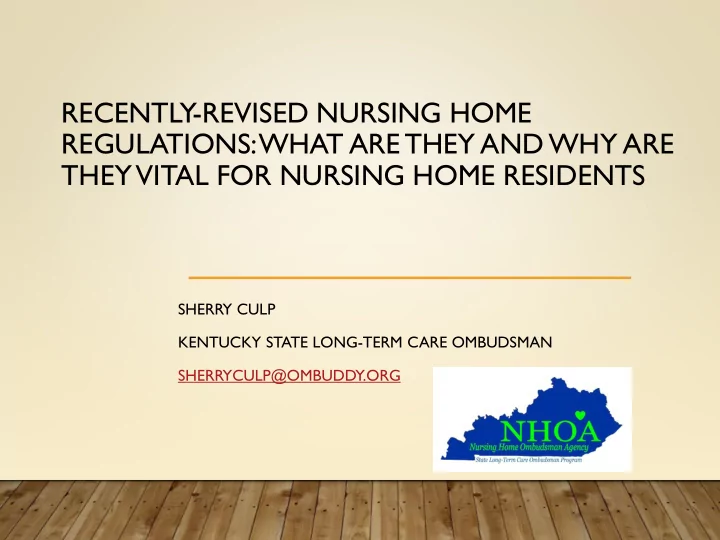

RECENTLY -REVISED NURSING HOME REGULATIONS: WHAT ARE THEY AND WHY ARE THEY VITAL FOR NURSING HOME RESIDENTS SHERRY CULP KENTUCKY STATE LONG-TERM CARE OMBUDSMAN SHERRYCULP@OMBUDDY.ORG
“Almost all nursing homes accept Medicare or Medicaid, or both. As a condition of accepting federal reimbursement, these nursing homes follow quality of care standards set by the Nursing Home Reform Law. The Reform Law became effective in 1990, and corresponding regulations were issued in 1991. The nursing home regulations become dated during the 25 years since they first were issued. To incorporate modern-day language, technological advances, and best practices, the Centers for Medicare and Medicaid Services (CMS) released a comprehensive revision of the regulations in September 2016.”
THEMES OF LTC FINAL RULE • Person-Centered Care • Quality Facility Assessment, and a Competency-Based Approach • Alignment with HHS priorities • Comprehensive Review and Modernization • • Implementation of Legislation
Phase Primary Implementation Phase 1 • Resident Rights and Facility Responsibilities* • Freedom from Abuse, Neglect, and Exploitation* Admission, Transfer, and Discharge* • Resident Assessment • (* this section is partially • Comprehensive, Person-Centered Care Planning* implemented in Phase 2 • Quality of Life and/or 3) • Quality of Care* Physician Services • • Nursing Services* • Pharmacy Services* • Laboratory, radiology, and other diagnostic services • Dental Services* Food and Nutrition* • • Specialized Rehabilitation • Administration (Facility Assessment – Phase 2)* • Quality Assurance and Performance Improvement* - QAA Committee • Infection Control – Program* Physical Environment* •
PHASED IMPLEMENTATION (CONT’D) Behavioral Health Services* Phase 2 • Quality Assurance and Performance Improvement* - QAPI Plan • • Infection Control – Facility Assessment and Antibiotic Stewardship ** • Physical Environment- smoking policies * Phase 3 • Quality Assurance and Performance Improvement* - Implementation of QAPI • Infection Control – Infection Control Preventionist * • Compliance and Ethics* Physical Environment- call lights at resident bedside * • Training * • * This section is partially implemented in other phases.
SOME IMPORTANT CONSUMER PROTECTIONS INCLUDE:
GREATER FOCUS ON ADDRESSING A RESIDENT’S INDIVIDUAL NEEDS AND PREFERENCES: A nursing home must… • Learn more about the resident! • Provide greater support for resident preferences! • Give residents more choices and control!
PROMPT DEVELOPMENT OF A CARE PLAN: • A facility must do a basic care plan within 48 hours of a resident’s admission
MORE COMPREHENSIVE CARE: • Treatment and services must now be expanded to include pain management, dialysis, and behavioral health
IMPROVED TRAINING: • Training requirements have been expanded to apply to all staff, contractual employees, and volunteers • Mandatory topics • Certified nursing assistant training expanded to include dementia management and resident abuse prevention
BETTER PROTECTIONS AGAIN ABUSE, NEGLECT AND EXPLOITATION: • Provisions related to abuse, neglect, and exploitation are now included in a separate section, which brings more attention and focus to these issues • New protections include prohibiting licensed individuals with a disciplinary action from being hired and requiring that suspicion of a crime be reported to law enforcement and the state survey and certification agency.
BETTER PROTECTION OF RESIDENT PROPERTY: • Nursing homes are now required to take reasonable care of resident property and can no longer seek waivers of their responsibility for lost of stolen property
INCREASED VISITATION RIGHTS: • The new regulations continue current law providing each resident with a right to receive visitors at any time.
PROTECTION AGAINST EVICTIONS: • New regulations specify that transfer-discharge for non- payment is inappropriate when the resident has submitted necessary paperwork to a third-party payor (such as Medicaid), and that payor is now evaluating the claim for payment. • Facilities will now be obligated to send a copy of each transfer- discharge notice to the state’s long -term care ombudsman program, which is available to advise the resident
LIMITING NURSING HOME’S ABILITY TO “DUMP” A RESIDENT AT THE HOSPITAL: • If a facility determines a resident “cannot return to the facility” then the facility must comply with transfer/discharge regulations “as they apply to discharges.” • A nursing home must now follow eviction procedures and give a hospitalized resident an opportunity to appeal, when the nursing home claims that the resident cannot return.
PROHIBITING FORCED ARBITRATION OF CLAIMS OF MISCONDUCT… • Currently, many nursing home admission agreements compel a resident to bring any future claims about abuse, neglect, or other quality of care issues through private arbitration … • CMS is currently in the process of taking comments on this… Why do we advocate that residents’ not be required to sign arbitration agreements when they enter into long-term care facilities?
WHAT ABOUT STAFFING REQUIREMENTS? • Although inadequate staffing is the greatest problem in nursing facilities today, the new regulations do not include a minimum staffing standard or a requirement for a 24-hour Registered Nurse. Instead, the new regulations continue current policy: requiring “sufficient” staffing levels, and Registered Nurse presence for eight hours daily • Staff must have “appropriate competencies and skill sets,” and staffing levels must take into consideration the number, acuity and diagnoses of the resident population, based on a newly mandated facility assessment.
Recommend
More recommend